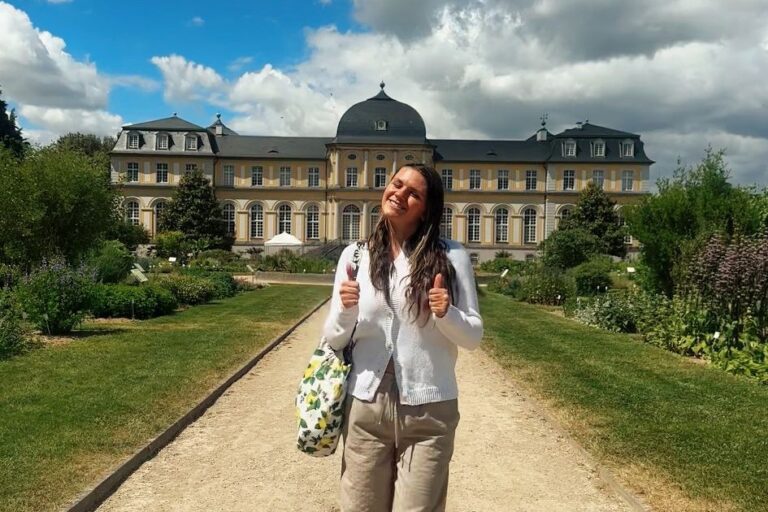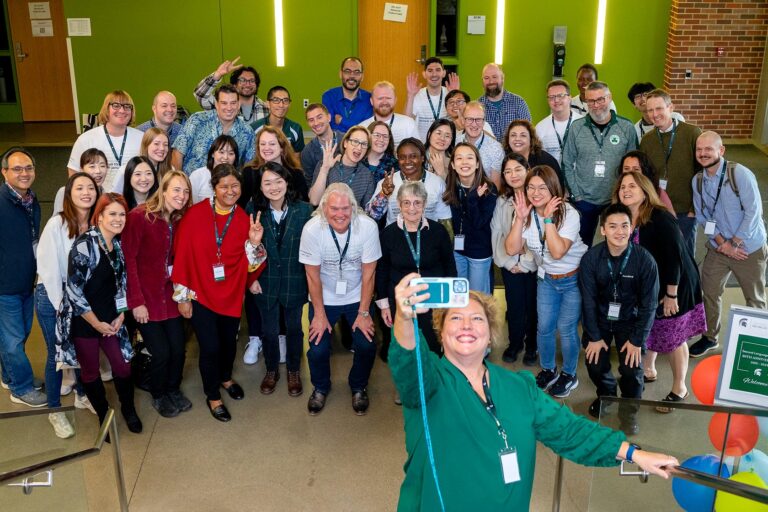Attending Michigan State University was an easy choice for Linguistics major Scott Nelson, whose parents both graduated from MSU, but determining a major wasn’t as easy until he found a home in the College of Arts & Letters and Linguistics.
“I randomly discovered Linguistics, found out more, and fell in love with it sort of superficially, but when I came to MSU and really started to study it, I found this sort of innate connection with it,” Neslon said, “Linguistics is the science of language, so it merges words and sounds and gives them a quantitative approach. I find peace with Linguistics.”
Nelson is dually enrolled in an undergraduate and graduate degree. After earning his undergraduate degree in Linguistics with a minor in Anthropology this May, he wants to devote his time to finishing his master’s degree and then go on to earn his Ph.D. and join the academic world as a Linguist.
Currently, Nelson is working on his Senior Thesis with his advisor for the project, Assistant Professor Karthik Durvasula.
“The research starts with the basic manners of linguistics, which are the how and the where — how you say the word or sound and where you say the word or sound in your mouth — and the relationship between phonetics, phonology, and speech perception. From there, we are going off of a huge research project done in the 2000s where researchers studied the space we have in our brains for the sounds “f” and “s” and if that space can be shifted.
I randomly discovered Linguistics, found out more, and fell in love with it sort of superficially, but when I came to MSU and really started to study it, I found this sort of innate connection with it.
“My thesis continues, in a way, where this project left off. We created a continuum of blended “f” and “s” sounds on either side of. This created an ambiguous mix of the two segments in the middle part of the continuum. We played various steps along the continuum to see where listeners categorized the ambiguous sounds as either an “f” or an “s”. We then did the same thing with “v” and “z”. The training phase that occurred before categorization contained only ambiguous “f” and “s” sounds therefore if there was a change to the “v” and “z” categorization it would have to be a change to the features that make up the segments not the segment itself that is being retuned (“v” and “z” share identical features to “f” and “s” other than voicing). We wanted to answer what the what is available to speech perception and the relationship between phonology and phonetics, and after going through all the tests and numbers we found.”
Nelson also is involved with research projects with his peers. “One research project is more about sociolinguistics and follows the relationship between culture and language,” he said. “It looks closely at different social groups such as gender, age, etc., and sees how they use language. The research project is proving that language is productive, and judging people based on how they speak isn’t necessary because, at the end of the day, it all means the same thing no matter how you say it.”
Nelson also worked with Associate Professor Suzanne Wagner when she was studying the Northern City Shift in Lansing. He worked odd jobs during the research like transcribing the data that would be used to create the coding scheme that will help generalize Linguistic data.
The hands-on experience with research, professors, and experts is invaluable and not something that every college has so it is pretty unique to be able to experience all of that while still in school.
Not only is Nelson involved in multiple research projects, he also is the President of QUALMS, MSU’s Linguistics club. As president, he works with all the members, runs meetings, and sets up activities, guest speakers, and presentations. He also helps coordinate two undergraduate Linguistic conferences throughout the year, one (MSULC) for MSU students only and the other (GLEEFUL) open to undergraduate students all across the country and Canada who are interested in Linguistics.
When it comes to getting involved and his success, Nelson credits the resources, programs, and professors MSU provides.
“One of the most helpful resources at the university is the library. I can go in and find whatever I am looking for, which is huge because Linguistics is such a small major and field, so to have so many books and digital resources provided in one place is a huge help for me,” he said. “When it comes to the major and program itself, CAL’s undergraduate research initiative has been one of the cornerstones of my education. The hands-on experience with research, professors, and experts is invaluable and not something that every college has so it is pretty unique to be able to experience all of that while still in school.”


